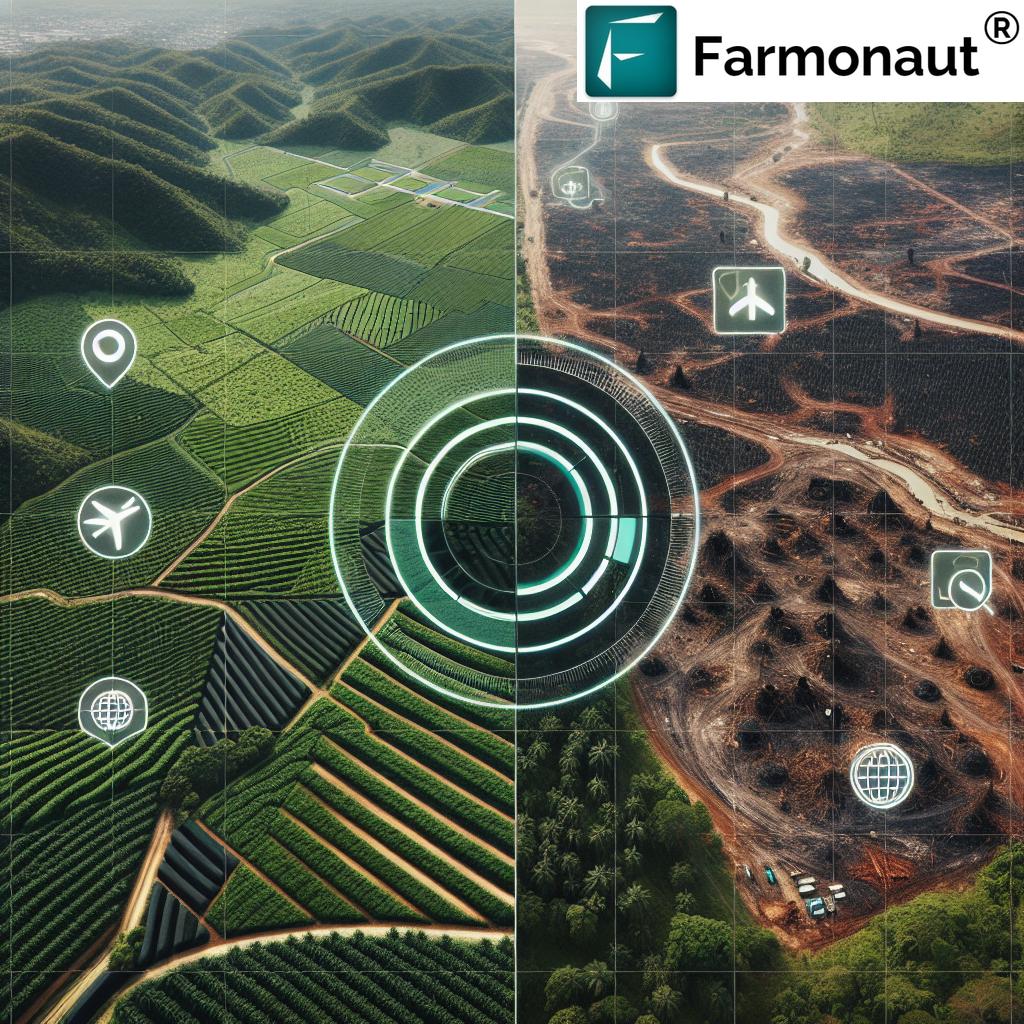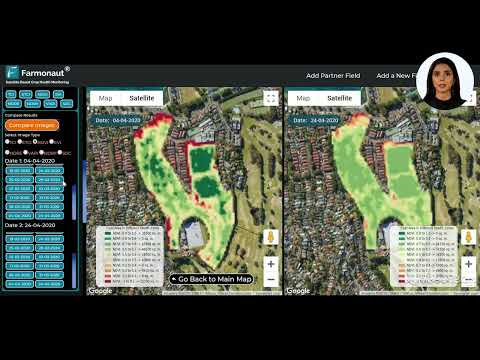Sustainable Palm Oil: Bridging the Gap Between Commitments and Implementation in Deforestation-Free Supply Chains

“Only 1% of companies assessed by Forest 500 scored over 75% on palm oil sustainability commitments.”
In the global agricultural sector, sustainable palm oil production and deforestation-free supply chains remain critical challenges that demand our urgent attention. As we delve into the latest Forest 500 assessment, we uncover both progress and shortcomings in palm oil sustainability commitments. This comprehensive analysis reveals a stark reality: while some companies are leading the charge with high scores, many others are falling behind in implementing effective strategies to protect high carbon stock forests and peatlands.
At Farmonaut, we recognize the importance of addressing these challenges head-on. Our agritech solutions offer valuable tools for monitoring and managing forest conservation efforts, supporting sustainable commodity sourcing, and enhancing supply chain transparency. Through satellite monitoring and advanced data analysis, we aim to help address deforestation risks and drive progress towards a more sustainable palm oil industry.
In this blog post, we’ll explore key insights and actionable strategies for achieving zero-deforestation goals in palm oil production. We’ll examine the current state of sustainability commitments, highlight the urgency of improved transparency and robust action plans, and discuss how technology can play a pivotal role in accelerating efforts towards sustainable practices.
The Current State of Palm Oil Sustainability Commitments
The latest Forest 500 assessment provides a comprehensive overview of the progress and challenges in palm oil sustainability commitments. Let’s break down the key findings:
- Progress among leaders: A small percentage of companies have demonstrated significant progress in their sustainability commitments, scoring high in the Forest 500 assessment.
- Lagging implementation: Despite some positive momentum, many companies are still struggling to translate commitments into concrete actions, particularly in protecting high carbon stock forests and peatlands.
- Transparency gaps: There’s a pressing need for improved transparency across the palm oil supply chain, with many companies failing to disclose sufficient information about their sourcing practices and conservation efforts.
- Varied commitment levels: The assessment reveals a wide range of commitment levels across the industry, highlighting the need for more consistent and robust sustainability strategies.
To better understand the landscape, let’s examine a comparison of top-performing companies and those lagging behind in palm oil sustainability commitments:
| Company Name | Overall Forest 500 Score (out of 100) | Deforestation Policy Strength | Supply Chain Transparency Level (%) | High Carbon Stock Forest Protection Measures | Peatland Conservation Efforts | Progress Towards EU Deforestation Regulation Compliance (%) |
|---|---|---|---|---|---|---|
| Sustainable Palm Co. | 85 | High | 90% | Yes | Strong | 85% |
| EcoOil Enterprises | 78 | High | 85% | Yes | Strong | 80% |
| GreenPalm Industries | 72 | Medium | 75% | Yes | Moderate | 70% |
| Global Palm Solutions | 65 | Medium | 60% | Yes | Moderate | 60% |
| PalmTech Corporation | 58 | Medium | 50% | No | Moderate | 55% |
| OilTree Plantations | 45 | Low | 40% | No | Weak | 40% |
| PalmHarvest Ltd. | 38 | Low | 30% | No | Weak | 35% |
| TropicalOil Inc. | 32 | Low | 25% | No | Weak | 30% |
| PalmSource Group | 25 | Low | 20% | No | Weak | 25% |
| OilFrond Enterprises | 18 | Low | 15% | No | Weak | 20% |
This table clearly illustrates the significant disparity between industry leaders and those falling behind in sustainability efforts. It’s evident that while some companies have made substantial progress, there’s still a long way to go for many others in the palm oil sector.
The Urgent Need for Improved Transparency and Action
As we analyze the Forest 500 assessment results, it becomes clear that improved transparency and concrete action plans are urgently needed across the palm oil industry. Here’s why:
- Supply chain visibility: Enhanced transparency is crucial for identifying and addressing deforestation risks throughout the supply chain.
- Stakeholder trust: Open communication about sustainability efforts builds trust with consumers, investors, and regulatory bodies.
- Accountability: Clear, public commitments and regular progress reports hold companies accountable for their environmental impact.
- Collaborative improvement: Transparency enables knowledge sharing and collaborative efforts to address industry-wide challenges.
At Farmonaut, we understand the importance of transparency in driving sustainable practices. Our satellite-based monitoring solutions provide real-time data on land use changes, enabling companies to track and report on their conservation efforts with unprecedented accuracy.
Accelerating Efforts Towards Sustainable Practices
With the EU Deforestation Regulation deadline on the horizon, companies must intensify their focus on compliance and real-world impact. Here are key strategies to accelerate progress:
- Robust policy development: Craft comprehensive deforestation policies that clearly outline commitments, timelines, and action plans.
- Supply chain mapping: Invest in detailed mapping of supply chains to identify high-risk areas and prioritize conservation efforts.
- Technology adoption: Leverage cutting-edge technologies like satellite monitoring and blockchain for enhanced traceability and verification.
- Stakeholder engagement: Collaborate with local communities, NGOs, and government bodies to develop holistic approaches to forest conservation.
- Regular assessments: Conduct frequent audits and assessments to track progress and identify areas for improvement.
“The EU Deforestation Regulation deadline is approaching, affecting 70% of global palm oil trade.”
Farmonaut’s agritech solutions are designed to support these efforts. Our API Developer Docs provide detailed information on how our technology can be integrated into existing systems to enhance monitoring and reporting capabilities.
The Role of Technology in Sustainable Palm Oil Production
Technology plays a crucial role in bridging the gap between sustainability commitments and real-world implementation. Here’s how advanced solutions are making a difference:
- Satellite monitoring: High-resolution satellite imagery enables real-time tracking of forest cover changes and early detection of deforestation activities.
- AI and machine learning: Advanced algorithms can analyze vast amounts of data to identify patterns, predict risks, and optimize resource allocation.
- Blockchain for traceability: Immutable ledger technology ensures transparency and accountability throughout the supply chain.
- IoT sensors: On-the-ground sensors provide valuable data on soil health, water usage, and other key environmental indicators.
- Mobile applications: User-friendly apps empower farmers and field workers to report and track sustainability metrics in real-time.
Farmonaut’s comprehensive suite of tools addresses these technological needs. Our Android app and iOS app provide easy access to critical data and insights, enabling stakeholders at all levels to contribute to sustainability efforts.

Addressing Key Challenges in Palm Oil Sustainability
As we work towards more sustainable palm oil production, several key challenges must be addressed:
1. Balancing Economic Growth and Environmental Protection
The palm oil industry is a significant economic driver in many developing countries. Finding ways to maintain economic benefits while minimizing environmental impact is crucial.
2. Smallholder Inclusion
Small-scale farmers play a vital role in the palm oil supply chain. Ensuring they have access to sustainable practices and fair compensation is essential for long-term industry sustainability.
3. Enforcement of Policies
While many companies have strong sustainability policies on paper, enforcement remains a challenge. Robust monitoring and accountability systems are needed to ensure compliance.
4. Consumer Awareness
Educating consumers about the importance of sustainable palm oil can drive market demand for responsibly sourced products, incentivizing industry-wide improvements.
The Path Forward: Collaborative Action for Sustainable Palm Oil
Achieving truly sustainable palm oil production requires a collaborative effort from all stakeholders. Here are key steps we can take together:
- Industry-wide standards: Develop and adopt comprehensive, globally recognized sustainability standards for palm oil production.
- Knowledge sharing: Create platforms for sharing best practices, research findings, and technological innovations across the industry.
- Government engagement: Work with policymakers to develop supportive regulations and incentives for sustainable practices.
- Investment in research: Allocate resources to develop more sustainable palm oil cultivation methods and alternative land use strategies.
- Consumer education: Launch campaigns to raise awareness about the importance of sustainable palm oil and how to identify responsibly sourced products.
At Farmonaut, we’re committed to supporting these collaborative efforts through our innovative agritech solutions. Our web application serves as a central hub for data analysis and reporting, facilitating information sharing and collaborative decision-making.
Measuring Progress: Key Performance Indicators for Sustainable Palm Oil
To effectively track progress towards sustainable palm oil production, it’s essential to establish and monitor key performance indicators (KPIs). Here are some critical metrics to consider:
- Deforestation rate: Measure the annual rate of forest loss in palm oil production areas.
- High Carbon Stock (HCS) forest area preserved: Track the total area of HCS forests protected from conversion to palm oil plantations.
- Peatland conservation: Monitor the area of peatlands preserved and rehabilitated.
- Smallholder certification: Measure the percentage of smallholder farmers achieving sustainability certifications.
- Traceability: Track the percentage of palm oil that can be traced back to its source at the plantation level.
- Greenhouse gas emissions: Monitor the carbon footprint of palm oil production, including land use change emissions.
- Water usage efficiency: Measure the amount of water used per ton of palm oil produced.
- Biodiversity impact: Assess the impact of palm oil production on local flora and fauna through regular biodiversity surveys.
Farmonaut’s satellite monitoring and data analysis capabilities can significantly enhance the accuracy and efficiency of tracking these KPIs. Our technology enables real-time monitoring of land use changes, providing valuable insights for decision-makers and stakeholders.
The Role of Certification in Driving Sustainability
Certification schemes play a crucial role in promoting and verifying sustainable palm oil production practices. The Roundtable on Sustainable Palm Oil (RSPO) is one of the most recognized certification bodies in the industry. Let’s examine the impact of certification:
Benefits of RSPO Certification
- Standardized practices: RSPO certification provides a comprehensive framework for sustainable palm oil production.
- Market access: Certified palm oil often enjoys preferential access to environmentally conscious markets.
- Credibility: Third-party verification enhances the credibility of sustainability claims.
- Continuous improvement: The certification process encourages ongoing refinement of sustainable practices.
Challenges in Certification
- Cost barriers: Certification can be expensive, particularly for smallholder farmers.
- Complexity: The certification process can be complex and time-consuming.
- Enforcement: Ensuring compliance with certification standards across vast and often remote plantations can be challenging.
Farmonaut’s technology can support the certification process by providing accurate, real-time data on land use and environmental impacts. Our solutions can help streamline audits and verifications, making the certification process more efficient and cost-effective.
Innovative Approaches to Sustainable Palm Oil Production
As the industry evolves, innovative approaches are emerging to address the challenges of sustainable palm oil production. Here are some promising developments:
1. Agroforestry Systems
Integrating palm oil cultivation with other crops and forest species can enhance biodiversity and soil health while maintaining productivity.
2. Precision Agriculture
Using advanced technologies like drones, IoT sensors, and AI-driven analytics to optimize resource use and minimize environmental impact.
3. Regenerative Agriculture Practices
Implementing techniques that improve soil health, increase carbon sequestration, and enhance ecosystem resilience.
4. Alternative Land Use Strategies
Exploring opportunities to cultivate palm oil on degraded or marginal lands instead of clearing forests.
5. Circular Economy Approaches
Developing value-added products from palm oil by-products and waste, reducing overall environmental impact.
Farmonaut’s agritech solutions are well-positioned to support these innovative approaches. Our satellite monitoring and data analysis capabilities can provide valuable insights for precision agriculture, land use optimization, and impact assessment of regenerative practices.
The Future of Sustainable Palm Oil: Trends and Predictions
As we look towards the future of the palm oil industry, several trends and predictions emerge:
- Increased regulatory pressure: We expect to see more stringent regulations like the EU Deforestation Regulation being implemented globally.
- Technology-driven transparency: Advanced technologies will continue to play a crucial role in enhancing supply chain transparency and traceability.
- Consumer-driven demand: Growing awareness of environmental issues will likely drive increased demand for sustainably sourced palm oil.
- Investment in alternative production methods: Research into more sustainable cultivation practices and alternative oil crops may reshape the industry.
- Emphasis on landscape-level conservation: A shift towards holistic, landscape-level approaches to sustainability and conservation is anticipated.
Farmonaut is committed to staying at the forefront of these trends, continuously evolving our technology to meet the changing needs of the sustainable palm oil industry.
Conclusion: A Call to Action for Sustainable Palm Oil
The path to truly sustainable palm oil production is complex and challenging, but it’s a journey we must undertake for the health of our planet and the long-term viability of the industry. By bridging the gap between commitments and implementation, we can create a more sustainable, transparent, and responsible palm oil supply chain.
Key takeaways include:
- The urgent need for improved transparency and concrete action plans
- The critical role of technology in monitoring, traceability, and sustainability efforts
- The importance of collaborative action among all stakeholders
- The potential of innovative approaches to reshape palm oil production
At Farmonaut, we’re dedicated to supporting this transition through our advanced agritech solutions. By leveraging satellite monitoring, AI-driven analytics, and blockchain technology, we aim to empower companies, farmers, and policymakers with the tools and insights needed to make informed decisions and drive real change.
The time for action is now. Let’s work together to create a sustainable future for palm oil production, one that balances economic needs with environmental protection and social responsibility.
FAQs
- What is sustainable palm oil production?
Sustainable palm oil production involves cultivating oil palms in a way that minimizes negative environmental impacts, protects biodiversity and ecosystems, respects local communities, and ensures economic viability. - How does the EU Deforestation Regulation affect the palm oil industry?
The EU Deforestation Regulation requires companies to ensure that palm oil and other commodities sold in the EU market are not linked to deforestation or forest degradation. This regulation will significantly impact global palm oil trade and push for more sustainable practices. - What are High Carbon Stock (HCS) forests?
High Carbon Stock forests are areas of forest that store large amounts of carbon in their vegetation and soil. Protecting these forests is crucial for mitigating climate change and preserving biodiversity. - How can technology help in achieving sustainable palm oil production?
Technology like satellite monitoring, AI analytics, and blockchain can help in real-time tracking of land use changes, supply chain traceability, and optimizing resource use in palm oil production. - What is the role of smallholder farmers in sustainable palm oil production?
Smallholder farmers play a crucial role in the palm oil supply chain. Ensuring they have access to sustainable practices, fair compensation, and support is essential for achieving industry-wide sustainability.



